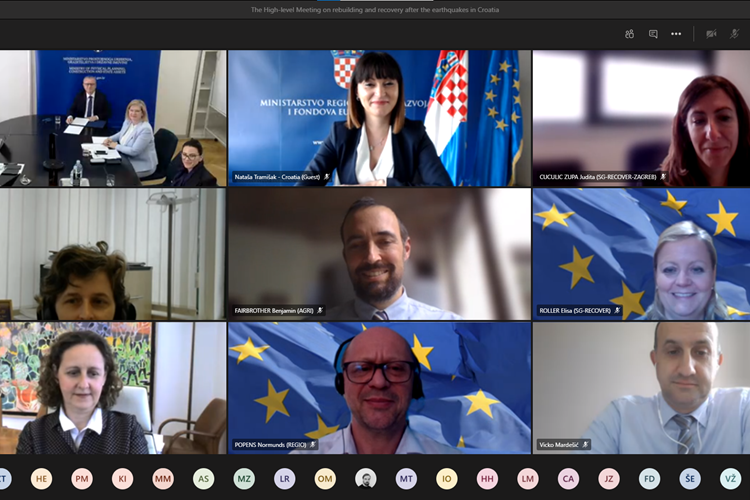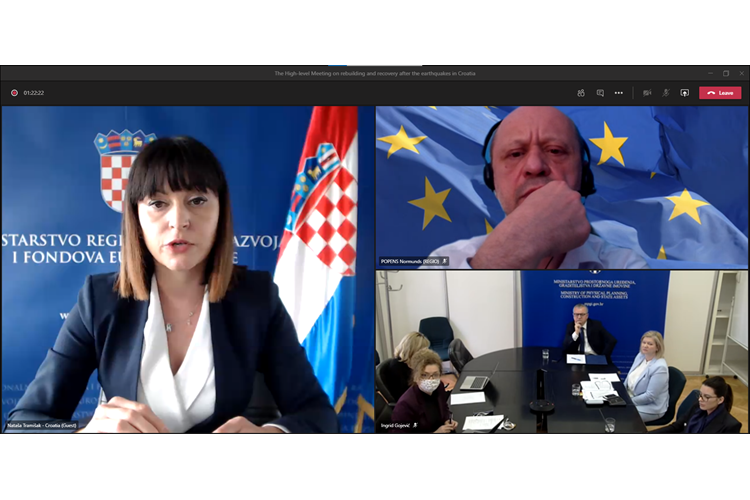- Published: 29.05.2021.
The second high-level meeting on recovery and reconstruction after the earthquakes
The devastating earthquakes which hit Croatia in March and December 2020 caused severe damage amounting to more than 17 billion EUR. The extent of damage requires close cooperation of stakeholders and activation of all available resources, with a significant amount being mobilised through various EU funds.
In this context, a second online high-level meeting on earthquake recovery and reconstruction was held on Friday 28 May 2021 between the European Commission and the Republic of Croatia. The Commission was represented by Mr Normunds Popens, Deputy Director-General at Directorate-General for Regional and Urban Policy, while the Croatian delegation was headed by Minister of Physical Planning, Construction and State Assets, Mr. Darko Horvat. Minister was supported by the Minister of Culture and Media, Mrs Nina Obuljen Koržinek, and Minister of Regional Development and EU Funds, Mrs Nataša Tramišak.The main topic of the meeting was to take stock of the progress regarding the development of a comprehensive multi-fund approach to the earthquake recovery and reconstruction with a view to ensuring successful implementation of the measures in the areas affected.
Deputy Director-General Popens highlighted that the comprehensive approach should focus on the identification of the most adequate source of funding for each type of operation, based on the specific regulatory framework characterising each fund. The main objective of this long-term earthquake strategy should be to help the recovery of the affected areas by coordinating all possible funding sources at the disposal of Croatia in order to reinforce synergies and complementarities between different financing sources and to avoid possible overlaps.
Minister Horvat emphasised that the legal framework for reconstruction has been established. The Reconstruction Fund started operating and procedures have been put in place to ensure transparency and control over the spending of public funds. However, recovery of the affected areas will be a lengthy process, especially since in most cases it involves build-back-better as the only acceptable and meaningful way to rebuild. “Both major earthquakes that hit Croatia in 2020 are specific in their own way, primarily due to the location of the epicentre and the consequences on the urban and rural environment, thus requiring a different approach to reconstruction. At the moment, we are in the middle of several very complex and demanding processes, including planning of the reconstruction, its implementation, but also finding sufficient funding. All this requires intensive cross-sectoral cooperation at national level, but also with the bodies of the European Commission. It is our imperative to ensure active and constructive cooperation and communication, with the aim of making all the ongoing processes as fast and simple as possible, especially since our Ministry has taken a leading role in the organization and implementation of reconstruction.”
Minister Obuljen Koržinek presented the activities on reconstruction so far and explained the challenges facing the reconstruction efforts. The COVID-19 pandemic is a serious constraint on implementation at all levels with market illiquidity directly affecting the state budget. She emphasized the problems with the capacity of the construction sector, especially the lack of skilled workforce, a significant increase of prices of construction materials and works and the extension of delivery times. A further issue is so-called progressive damage, i.e. increase of damage to previously damaged buildings after the earthquake in March. Nevertheless, the entire allocation of the EUSF in the cultural heritage sector has been contracted, even with significant overbooking.
Minister Tramišak gave an update on contracts for projects for renovation of family houses owned by the Republic of Croatia in earthquake-affected areas and removal and construction of replacement housing units (family houses and multi-apartment buildings) owned by the Republic of Croatia on earthquake-affected areas, which were signed this week. In cooperation with the Central State Office for Reconstruction and Housing, was ensured 672.3 mln kuna from the European Regional Development Fund for the above-mentioned projects.
In mid-December 2020, an amount of around 683 million EUR was granted from the EU Solidarity Fund (EUSF) to Croatia for the reconstruction of the area of the City of Zagreb and Zagreb and Krapina-Zagorje Counties. As the EUSF funds can only be used for essential emergency and recovery, which in most cases is sufficient, comprehensive reconstruction will be financed by combining several available resources. In addition, for the damage caused by a series of earthquakes with the epicentre in the Sisak-Moslavina County in December 2020, Croatia submitted a new request for assistance from the EUSF in March 2021, and a decision on this is still pending.
Other current sources of funding include the European Social Fund (EUR 15.7 million) and the European Agricultural Fund for Rural Development (EUR 15.9m). As regards future perspectives, the National Recovery and Resilience Plan has been submitted to the Commission and includes Flagship initiative ‘Building Renovation’ (dedicated reforms and investments of over 5.9 billion kn). The Croatian authorities also plan to propose part of the European Regional Development Fund allocation of the 2021-2027 to support the longer-term recovery efforts.
The high level participants on Croatian and Commission side took stock of the progress already made on the ground and agreed that efforts shall continue to ensure a comprehensive approach, quickly identify bottlenecks and together find solutions. Cooperation shall continue between the services at working level during the summer months, and a further high level meeting will be organised in mid-September 2021.

